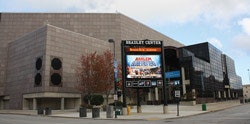Do stadium and arena employees have a legally protected interest in their jobs?

Do stadium and arena employees have a legally protected interest in their jobs? If they are fired, does the venue owe them certain due process requirements? And if the facility in question was created by the state and underwritten through philanthropy efforts, does that change the rights owed?
Those are just some of the questions considered by the United States Seventh Circuit Court of Appeals in Glenn v. Bradley Center Sports and Entertainment Corporation [2013 U.S. App. LEXIS 1706].
COPIED DOCUMENTS
Micah Glenn entered a training program to work as an arena control operator at what is now known as Milwaukee's BMO Harris Bradley Center, a facility created by the Wisconsin Legislature through the donation of a single family. The venue hosts three sports teams and countless special events.
Three months after beginning his training, the Bradley Center hired Glenn permanently as an arena control operator. A year later, he was fired when he violated policies in the employee handbook by copying Bradley Center documents onto a flash drive.
In challenging his dismissal, Glenn argued that his due process rights were infringed upon because the arena fired him without notice or a hearing. In particular, Glenn claimed that under the due process clause, the Bradley Center failed to provide him with constitutional guarantees found in the Fourteenth Amendment of the U.S. Constitution, which prohibits state and local governments from depriving individuals of life, liberty or property without certain steps being taken to ensure fairness.
Attorneys for the Bradley Center responded that Glenn had no property interest in his employment because he was an at-will employee and was fired for just cause. With arena management unwilling to give him back his job, Glenn filed a lawsuit claiming that the Bradley Center violated his due process rights.
LIBERTY LOST?
Because due process requirements only apply to governmental actions - not to those of private entities - the court determined that before proceeding, Glenn needed to establish that there was state action, and if so, show that he was deprived of life, liberty or property interest.
Finding that Glenn was unable to clear the first hurdle and that the Bradley Center was not a state actor, the trial court dismissed Glenn's suit. On appeal, Glenn challenged the trial court's conclusion that the Bradley Center is a private entity, claiming that the Wisconsin Legislature created the center by special law (Wis. Stat. § 232.03) and that the state's governor, with the advice and consent of the Senate, retains permanent authority to appoint a majority of the Bradley Center's board of directors.
The court, however, ruled that it need not decide whether the Bradley Center is a state actor, because Glenn failed to allege any constitutionally protected interest in his employment by the arena. To establish a due process claim, the court held, Glenn needed to identify a protected property or liberty interest in his employment.
Glenn argued a personal property interest in his employment based on his belief that Wisconsin's civil-service law unconstitutionally exempts Bradley Center employees from civil-service protections. But the court noted that the Wisconsin Legislature may elect not to confer a property interest in public employment and do so without violating the Constitution. Therefore, the court deemed, Glenn did not have a property interest in his employment, and the arena did not violate his due process by firing him without a hearing.
Finally, Glenn contended that, even if he did not have a property interest in his employment, due process still guaranteed him a hearing because the Bradley Center, which fired him based on charges of dishonesty, infringed on his liberty interest and good name and reputation in the community. Citing Wisconsin v. Constantineau [400 U.S. 433 (1971)], Glenn argued that where a person's good name, reputation, honor or integrity is at stake because of what the government is doing to that individual, notice and an opportunity to be heard are essential.
In rejecting this argument, the Seventh Circuit Court of Appeals cited the U.S. Supreme Court's decision in Paul v. Davis [424 U.S. 693 (1976)] and held that under the "stigma plus" test Glenn did not have a due process claim unless he was stigmatized by the defendant's conduct, the stigmatizing information was publicly disclosed and he suffered a tangible loss of other employment opportunities as a result of that public disclosure.
Under this test, the court found that - because Glenn failed to show that the Bradley Center publicly disclosed the charges against him or that he was denied a future employment opportunity because of those charges - the arena did not infringe on his liberty interest or on his good name and reputation in the community.
EMPLOYERS BEWARE
While Glenn lost his lawsuit, there are two key points facility managers should keep in mind based on the Seventh Circuit Court's decision:
1. As the court noted, Glenn's employment relationship with the Bradley Center was at-will, which allows both parties to terminate the relationship at any time with or without advance notice and for any (or no) reason. Because most employment in the United States involves at-will employment relationships, facility employees do not have a legally protected employment relationship, or a protected right that employment will continue or end only on certain conditions.
The two general exceptions to this rule: when employee and employer enter into an employment contract for a definite number of years, and when a union and employer enter into a collective bargaining agreement protecting the employees. It should also be noted that several states and courts have established limited exceptions, especially if unlawful discrimination is involved regarding the termination of an employee.
Therefore, to increase the likelihood that courts will enforce an at-will employment relationship, facility managers should include a clause or disclaimer in their employee handbooks identifying all employees as at-will.
2. Even though the court ruled that a person's good name, reputation, honor or integrity alone do not equal a protected liberty interest, it remains essential that administrators forced to terminate an employee be careful not to publicly disclose any information about why that employee was terminated.




































